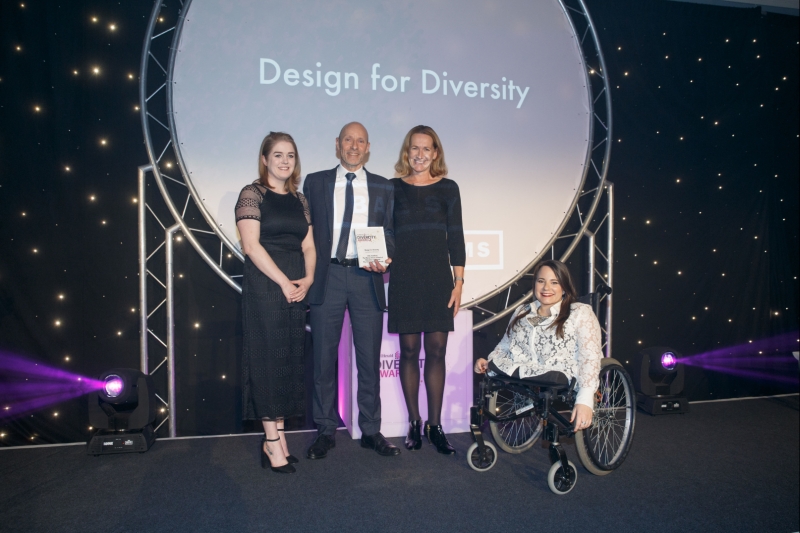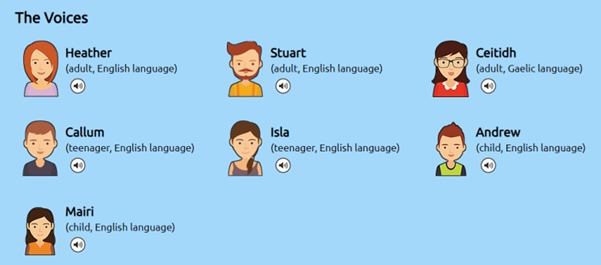 Newsletter: join thousands of other people
Newsletter: join thousands of other people
Once a month we'll send you an email with news, research and thoughts, as well as training courses and free webinars you may wish to attend.
Our websites:
Posted by Paul Nisbet on the 11th October, 2019

The partnership between CALL and CereProc to develop and licence Scottish Computer voices was recognised on Wednesday night when we won the Design for Diversity category at the 2019 Herald & GenAnalytics Diversity Awards. Paul and Shirley donned their glad rags and received the prize at the award dinner in Glasgow.

Philippa Arter, Chief of Staff, Naval Ships at BAE Systems; Paul Nisbet and Shirley Lawson from CALL; Amy Conachan, actress, who hosted the ceremony.
The Design for Diversity category is sponsored by BAE Systems and is given to "an organisation of any size and from any sector who has delivered a project in Scotland that captures and can provide evidence of an inclusive design process including accessible design and assistive technology to enable the broadest range of users".
The judges were looking for:
- A project that has recognised and embraced diversity in design practices
- The benefits of design decisions that has led to greater accessibility for all individuals
- Measures of the impact or outcomes achieved by the project.
The award was given in recognition of our partnership with CereProc to develop, license and distribute high quality Scottish computer voices for the Scottish public sector. The work spans over a decade and began in 2005 when CALL led research and development of Digital Question Papers on behalf of SQA. Learners with dyslexia or visual impairment used a computer reader to read the papers but they were not impressed with the robotic US and English computer voices available at the time. We therefore approached CereProc and negotiated a licence for Scottish schools for Heather, which was the only Scottish accent computer voice in existence.
In 2011 we obtained funding from Scottish Government to support CereProc to create Stuart, the world’s first male Scottish computer voice. Ceitidh, the world’s first Scottish Gaelic computer voice, was developed and launched in 2015 so that learners who use Gaelic Medium would have the same equality of access to assessments, examinations and learning materials.
We believe that the impact of this work has been significant. When SQA first offered Digital Question Papers in 2008, human readers were one of the most popular methods of support. Ten years later, more candidates with additional support needs are using technology than are using human readers or scribes and we believe that this is due in part to the Scottish computer voices. Curriculum for Excellence aims to help young people to become successful learners, confident individuals, responsible citizens and effective contributors. How well are we meeting these goals if our young people finish their school careers by sitting exams where someone reads to them and writes down their answers? By using technology, our young people can demonstrate their knowledge and skills independently and also develop vital skills for life. Moreover, since learners can now read textbooks and learning materials more independently, they are more able to learn and therefore to achieve better grades in examinations in the first place.
The three voices are also used by children and adults who use voice output communication aids but of course they are adult voices and for some time we wanted to create and provide Scottish child voices for children who use voice equipment. Scottish Government again provided funding and we worked with CereProc to create the world’s first Scottish computer child voices, Andrew and Mairi, who were launched together with Callum and Isla, teenage voices, on 5th August 2019.

I was very pleased to win the Design for Diversity award for two reasons: firstly because the Scottish Voice partnership brings CereProc's world-leading Scottish engineering to people with disabilities across the country, and secondly because it was sponsored by BAE. My father, who died in June last year, worked for Ferranti for over 40 years and was the Deputy Managing Director in Edinburgh from the 80’s. Ferranti was a major defence firm and employed about 10,000 people in Edinburgh at that time. He retired in 1996 and the division that he managed became part of BAE in 2000. He would be happy that BAE sponsored the award.
The Diversity Awards are really quite special – I love the diversity of the diversity! The range of activities and projects, the scale of some of them, and the impact they have on the lives of people is a real eye opener.

4-week short study online course

Once a month we'll send you an email with news, research and thoughts, as well as training courses and free webinars you may wish to attend.
Our social media sites - YouTube, Twitter and Facebook